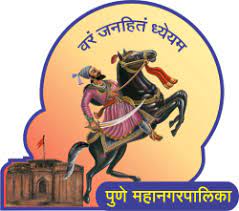Pune Mahanagarpalika Bharti Syllabus And Exam Pattern PDF
| अ क्र | विषय | तपशील |
| 1 | मराठी | समानार्थी शब्द, विरुध्दार्थी शब्द, काळ व काळाचे प्रकार, शब्दांचे प्रकार- नाम, सर्वनाम, क्रियाविशेषण, क्रियापद, विशेषण, विभक्ती, संधी व संधीचे प्रकार, म्हणी, वाक्यप्रचारांचे अर्थ व उपयोग, शब्दसमुहाबद्दल एक शब्द |
| 2 | इंग्रजी | Vocabulary, synonyms & antonyms, proverbs, tense & kinds of tense, question tag, use the proper form of the verb, spot the error, verbal comprehension passage, etc., spellings, sentence structure, one-word substitutions, phrases Article, Prepositions, Spelling, Punctuation, Expression, Simple Sentence structure, Grammar, Use of Idioms and Phrases & their meaning |
| 3 | सामान्य ज्ञान | दैनंदिन घटना, इतिहास, भूगोल, नागरिकशास्त्र इ., चालू घडामोडी ( भारतातील व महाराष्ट्रातील), क्रीडा व साहित्य विषयक ( भारतातील व महाराष्ट्रातील), भारतीय अर्थव्यवस्था, भारतीय राज्यघटना, न्यायमंडळ शैक्षणिक व आरोग्य शिक्षण विषयक माहिती अधिकार अधिनियम, 2005, संगणक माहिती तंत्रज्ञान, जीएसटी आर्थिक सुधारणा व कायदे (खरेदी प्रक्रिया) |
| 4 | बौद्धिक चाचणी | उमेदवार किती लवकर व अचूकपणे विचार करु शकतो हे आजमावण्यासाठी प्रश्न |
PMC Civil Engineering Syllabus
- Building Materials, Estimating, Costing and Valuation, Surveying, Soil Mechanics, Hydraulics, Irrigation Engineering, Transportation Engineering, Environmental Engineering. Structural Engineering: Theory of Structures, Concrete Technology, RCC Design, Steel Design.
- Civil Engineering Building Materials : Physical and Chemical properties, classification, standard tests, uses and manufacture/quarrying of materials e.g. building stones, silicate based materials, cement (Portland), asbestos products, timber and wood based products, laminates, bituminous materials, paints, varnishes.
- Estimating, Costing and Valuation: estimate, glossary of technical terms, analysis of rates, methods and unit of measurement, Items of work – earthwork, Brick work (Modular & Traditional bricks), RCC work, Shuttering, Timber work, Painting, Flooring, Plastering. Boundary wall, Brick building, Water Tank, Septic tank, Bar bending schedule, Centre line method, Mid-section formula, Trapezodial formula, Simpson’s rule. Cost estimate of Septic tank, flexible pavements, Tube well, isolates and combined footings, Steel Truss, Piles and pile-caps. Valuation – Value and cost, scrap value, salvage value, assessed value, sinking fund, depreciation and obsolescence, methods of valuation.
- Surveying : Principles of surveying, measurement of distance, chain surveying, working of prismatic compass, compass traversing, bearings, local attraction, plane table surveying, theodolite traversing, adjustment of theodolite, Levelling, Definition of terms used in levelling, contouring, curvature and refraction corrections, temporary and permanent adjustments of dumpy level, methods of contouring, uses of contour map, tachometric survey, curve setting, earth work calculation, advanced surveying equipment.
- Soil Mechanics : Origin of soil, phase diagram, Definitions-void ratio, porosity, degree of saturation, water content, specific gravity of soil grains, unit weights, density index and interrelationship of different parameters, Grain size distribution curves and their uses. Index properties of soils, Atterberg’s limits, ISI soil classification and plasticity chart. Permeability of soil, coefficient of permeability, determination of coefficient of permeability, Unconfined and confined aquifers, effective stress, quick sand, consolidation of soils, Principles of consolidation, degree of consolidation, pre-consolidation pressure, normally consolidated soil, e-log p curve, computation of ultimate settlement. Shear strength of soils, direct shear test, Vane shear test, Triaxial test. Soil compaction, Laboratory compaction test, Maximum dry density and optimum moisture content, earth pressure theories, active and passive earth pressures, Bearing capacity of soils, plate load test, standard penetration test.
- Hydraulics : Fluid properties, hydrostatics, measurements of flow, Bernoulli’s theorem and its application, flow through pipes, flow in open channels, weirs, flumes, spillways, pumps and turbines.
- Irrigation Engineering: Definition, necessity, benefits, 2II effects of irrigation, types and methods of irrigation, Hydrology – Measurement of rainfall, run off coefficient, rain gauge, losses from precipitation – evaporation, infiltration, etc. Water requirement of crops, duty, delta and base period, Kharif and Rabi Crops, Command area, Time factor, Crop ratio, Overlap allowance, Irrigation efficiencies. Different type of canals, types of canal irrigation, loss of water in canals. Canal lining – types and advantages. Shallow and deep to wells, yield from a well. Weir and barrage, Failure of weirs and permeable foundation, Slit and Scour, Kennedy’s theory of critical velocity. Lacey’s theory of uniform flow. Definition of flood, causes and effects, methods of flood control, water logging, preventive measure. Land reclamation, Characteristics of affecting fertility of soils, purposes, methods, description of land and reclamation processes. Major irrigation projects in India.
- Transportation Engineering: Highway Engineering – cross sectional elements, geometric design, types of pavements, pavement materials – aggregates and bitumen, different tests, Design of flexible and rigid pavements – Water Bound Macadam (WBM) and Wet Mix Macadam (WMM), Gravel Road,
- Bituminous construction, Rigid pavement joint, pavement maintenance, Highway drainage, Railway Engineering- Components of permanent way – sleepers, ballast, fixtures and fastening, track geometry, points and crossings, track junction, stations and yards. Traffic Engineering – Different traffic survey, speed-flow-density and their interrelationships, intersections and interchanges, traffic signals, traffic operation, traffic signs and markings, road safety.
- Environmental Engineering: Quality of water, source of water supply, purification of water, distribution of water, need of sanitation, sewerage systems, circular sewer, oval sewer, sewer appurtenances, sewage treatments. Surface water drainage. Solid waste management – types, effects, engineered management system. Air pollution – pollutants, causes, effects, control. Noise pollution – cause, health effects, control.
PMC Syllabus PDF 2024
Pune Mahanagarpalika Bharti Syllabus And Exam Pattern PDF: Advertisement no. 1/1362, dated 06/03/2023 is being published. The posts advertised are in Health, Parks, Engineering, Technical and Fire Services. So there must be sufficient number of candidates for comparative competition. Also, advertisement is being given to get sufficient response for the present recruitment. According to the above advertisement details of vacancies, educational qualification required for the posts, pay scale, age limit, examination fee,online application method, application deadline and other necessary terms and conditions etc. are given on this link. PMC Udyan Syllabus, PMC Agnishaman Vibhag Exam Pattern and Syllabus is given in this section. Pune Municipal Corporation https://pmc.gov.in/ Whole Syllabus and Exam Details are given below:
Also Read: MPSC Civil Engineering and Electrical Engineering Exam 2023 Questions Papers
PMC Syllabus New PDF | Pune Mahanagarpalika Bharti Syllabus and Exam Pattern PDF Download



